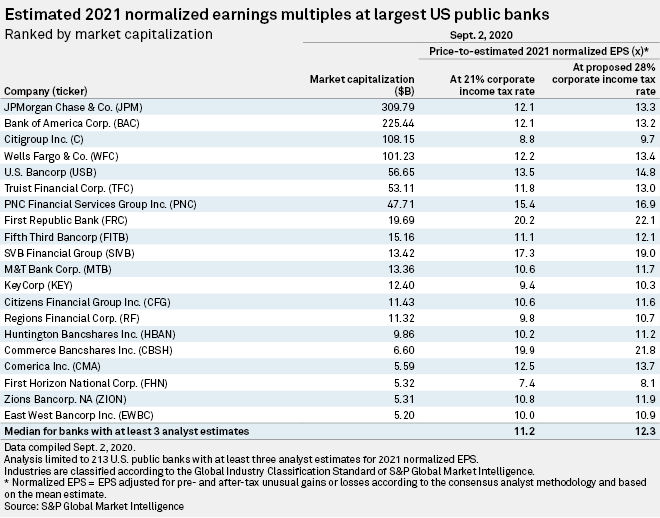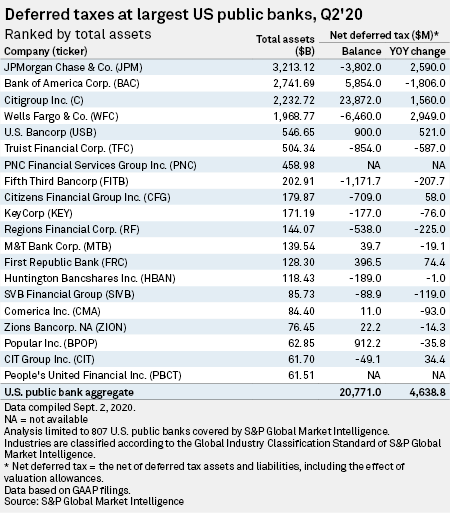As the US elections approach, a change of guard could create income headwinds from higher taxes, but a rise in the corporate tax rate could result in higher book values for banks with deferred tax assets.
Tax cuts that were passed in 2017 are arguably the legislative achievement of President Donald Trump. Democratic candidate Joe Biden has proposed that the lower corporate tax rate, which has fallen from 35% to 21%, be partially reversed. Proposing to raise the corporate tax rate to 28%, Biden said in a Sept. 10 interview with CNN that the corporate tax rate hike would be a “Day 1” priority.
Biden’s plan could see the country’s top 10 banks drop their combined annual net profits by more than $ 7 billion, according to an analysis by S&P Global Market Intelligence, which uses the average of equity analysts’ estimates for 2021. The analysis also looked at 209 publicly traded banks with at least three analyst estimates and found that a 28% tax rate would reduce the universe’s total annual income by $ 9.36 billion.
But there are many ifs that must occur before such a change becomes likely.
Biden has to win the White House. The Democrats must win the Senate while keeping the House of Representatives. Then the legislators would have to approve Biden’s platform proposal if Biden so decides.
“We must always remember that political promises seldom materialize on the campaign route,” said Isaac Boltansky, an analyst at Compass Point Research & Trading LLC.
CONTINUE READING: Sign up for our weekly election newsletter here, and read our latest coverage here.
Historically, banks’ tax bills have been more in line with the statutory tax rate than in other industries, such as technology. This means that an increase in the corporate tax rate will have a more direct impact on bottom line. This could hurt bank valuations, especially according to investors who focus on price-to-earnings multipliers. Under the current tax system and at current prices, the analyzed universe of 213 public banks shows an 11.2-fold price forward earnings multiple, with no unusual gains or losses before and after taxes. An increase in the tax rate to 28% would increase the multiple to 12.3 times.

At the same time, investors have lately preferred non-fiction books as the primary valuation metric over future earnings. With that in mind, a corporate tax rate hike could have a positive impact on valuations, considering that some banks have significant deferred tax assets that could be more valuable after a tax hike. DTAs represent future tax savings that can help businesses offset higher rates.
The impact of higher income taxes will not be uniform across the industry, but will depend on the net deferred taxes for each institution. Banks regularly reassess deferred tax assets and liabilities. An increase in the tax rate increases the recoverability of the deferred tax assets and ensures an increase in earnings in the new assessment quarter, which would benefit the material book values.
“Overall, it would be negative for earnings, but … it would be essentially a tiny capital increase amid a dynamic in banking where investors have written off multiple earnings valuations and are really focused on tangible book value,” said Kevin Swanson, director of Equity Research of the Hovde Group. “Any little boost you can get, small or large, is certainly a positive one.”

Citigroup Inc. has the most deferred tax assets in the banking sector at $ 23.87 billion, but many of the 807 publicly traded banks have deferred tax liabilities. Without Citigroup, the industry as a whole has a liability, making Citigroup’s assets exceed the industry-wide total of $ 20.77 billion.
Of course, banks will likely only have to consider the short-term effects of a higher tax system should Biden win the White House, which is not certain. And even if Biden wins, increasing the corporate tax rate may not be possible if Republicans retain control of the Senate. In this scenario, Boltansky estimates the likelihood of an increase in the corporate tax rate to be 60% and likely predicts a smaller increase in the 23-24% range.
Should Trump win his re-election, higher corporate taxes could be on the table towards the end of his second term, Boltansky said. The 2017 income tax cut is expected to expire in 2025, and – Assuming the Democrats still have control of the House of Representatives, liberal lawmakers may be able to demand higher corporate taxes in exchange for maintaining household tax cuts.
Should the Democrats take over the House of Representatives, Senate and White House in November, Boltansky does not expect the corporate tax rate to rise to 28%. He said the tax rate will almost certainly go up, but he anticipates a tax rate of 25% or 26%. With the economy likely still struggling to recover from the pandemic-induced recession, Boltansky said moderate Democrats in conservative states like Montana Senator Jon Tester would push back a substantial tax hike.
“It doesn’t matter if the Republicans agree. Can you … [Alexandria Ocasio-Cortez] and testers agree? “said Boltanksy.

